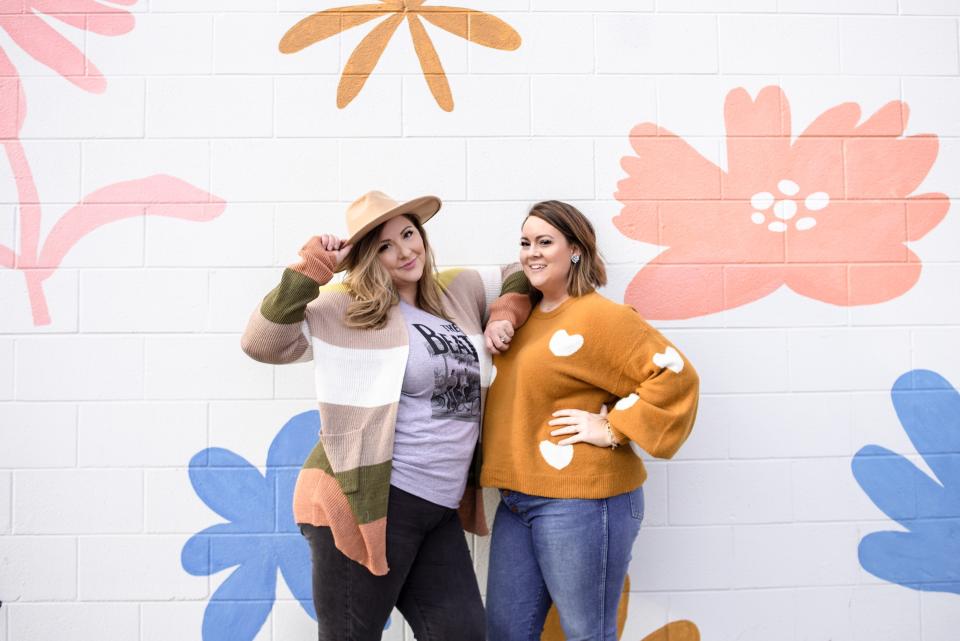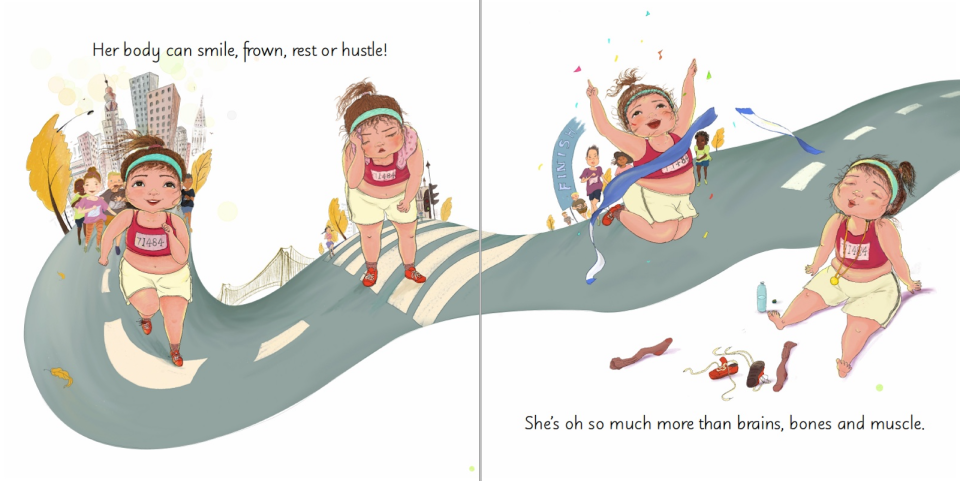The First Body-Positive Children’s Book Just Came Out, and It’s Exactly What the World Needs Now
Chances are, if you’ve taken a stroll through the children’s-book section of bookstores or libraries recently, you’ve seen a lot of bright colors and catchy titles. You saw some good lessons on friendship and manners, some lively adventure stories and some cute animals. You also saw a lot of pictures of straight-size white girls. While children’s literature now features far more diverse stories than it did even a couple of years ago, there is still one movement that hasn’t gotten a foothold in the market: body positivity.
Just nine months ago, Atlanta-based bloggers Ady Meschke and Katie Crenshaw identified this gap and set out to do their part to fill it. Both women focus on body positivity online—plus, they’re both moms. The combination of social media savvy and real-world experience fueled the passion project, and their new children’s book, Her Body Can, comes out this week. Now available on Amazon (and soon for sale on shelves in major retailers), the book is geared toward children ages eight and under. That was essential for Meschke and Crenshaw, who both know how important it is for girls to internalize positive messages about their body before the biases of mainstream culture seep in. And since reports show that, by the time girls are 13, 53% express dissatisfaction with their body, and up to 50% of girls in grades K through 8 are concerned about their weight, reaching them young seems essential.
Ahead of the book’s release, Glamour caught up with Meschke and Crenshaw to talk books, representation, and the power of acceptance.
Glamour: What makes Her Body Can stand out from other children’s books?
Ady Meschke: There are books out there that teach kids how to overcome bullying or other adversity, but we thought, Why do we have to show bullying to teach kids to be nice? We just want this to be about representation without there being anything negative in our girl’s life.
Katie Crenshaw: We wanted to portray a plus-size kid living her best life, with no apologies.
Ady: I read somewhere that there are more monsters in children’s books than people of different sizes and ethnicities. We want to change that!
So this is basically about bringing the power of representation to our kids.
Katie: My daughter has a large facial birthmark, so lack of representation has always been at the forefront of my brain, and I have always been hyper aware of making sure she knew that what made her physically different didn’t define her happiness or success. Having atypical-looking children represented in the media our children consume is incredibly important.

Ady: And that is why we were so conscious to have the illustrations in the book portray friends of all different types: kids with different physical abilities, different hairstyles, different races, different sizes, and different religions. The pictures in this book say loud and clear, “Everyone is equal.”
Why is this book important now?
Ady: Body positivity is a movement right now in our space as adults, and I love it, but it needs to be taught at a young age, and that’s our goal. Just yesterday I got trolled on the internet and called fat, and that’s not going to stop me from being me, but that confidence in myself is very new. And honestly the process of writing this book has really helped me choose definitively to put away a lot of my negative thoughts once and for all. I really believe that if I’d had a book as a kid that taught this type of message, maybe it wouldn’t have taken me until I was 34 to be that confident. The book is definitely about teaching kids not only to accept and love themselves, but accepting and loving others for their differences too.
What inspired the book’s title?
Katie: Ady’s original brainstorm for the book was a plus-size princess, but after our first creative meeting, we were really gravitating toward action statements and things this girl could do. I had already started a movement called #herbodycan, focused on what our bodies can do versus their appearance, and with the ultimate direction of this book, that title just made sense here too.
Did any of your personal life experiences shape the book?
Ady: It was really important to us to address specific restrictions that were imposed upon us growing up because of our size, and negate them. My whole life I heard, “Don’t wear two-piece bathing suits, don’t wear white, don’t wear color, don’t wear crop tops,” so we made it a point to have our heroine wear every single thing we were told we couldn’t wear because of our size. We want to change that narrative for the next generation of children.

What do you hope to offer parents with your book?
Katie: Most of us were parented in an atmosphere that was fatphobic, and most of us have outdated, ingrained ideas on body image. We are all likely trying to do the same work on ourselves that we are trying to teach our children, and it’s not easy. Having something tangible like a book when trying to teach anything to children is key, and not only is this book a great tool for sensitive moments; it is also just a happy, uplifting story of a girl who lives her best kid life in the body she was born with, and what else could we hope for in a child?
It was shocking for me last year when my son came home from school, having learned about calories, and as a third grader, he was worried about what he could eat. He said the kids at school told him he would get fat if he ate too many calories and that he already had fat cheeks. Reliving that kind of hurt through your children is painful. We spent a lot of time talking about what calories actually are, why we need them, and why the size of our bodies doesn’t necessarily indicate health, but what about the kids that don’t get those conversations at home? That’s why we also want to see our book in libraries and classrooms.
Given your social media presences, you open yourselves up to a lot of public scrutiny. What feedback about the book have you received from your online communities?
Katie: I don’t think I fully grasped how needed this book was until everyone else responded so favorably to our idea. Even women who don’t have kids have told me, “I just want to parent myself with this book!”
Ady: Although the book is aimed at children, it also has nods to plus-size adults, as well. As a travel blogger, I often hear women say they are nervous about traveling because of their size, so the girl in our book travels, and she’s not afraid to run in a race, and Katie ran the New York Marathon last year despite not looking like a “typical runner,” so it’s about just being thankful for your body in general. It’s definitely applicable!
I couldn’t help but notice that your Instagram page is @BodyCanBooks, plural. So we can expect more in this series?
Katie: We are in our first round of edits with His Body Can, which will obviously have a male protagonist and focus on little boys’ insecurities and gender roles. It should be out later this year.
Ady: We’ve also discussed bringing out different friends who are background characters in Her Body Can and having them star in their own books. We want kids to be able to look at the cover of a book and say, “That’s someone like me!” and just continue to reinforce the message that everyone is equal.
Emily L. Foley is a freelance lifestyle writer and trend expert. She writes about everything from mascara to women’s issues and also shares the latest fashion and beauty trends and tips on TV.
Originally Appeared on Glamour

